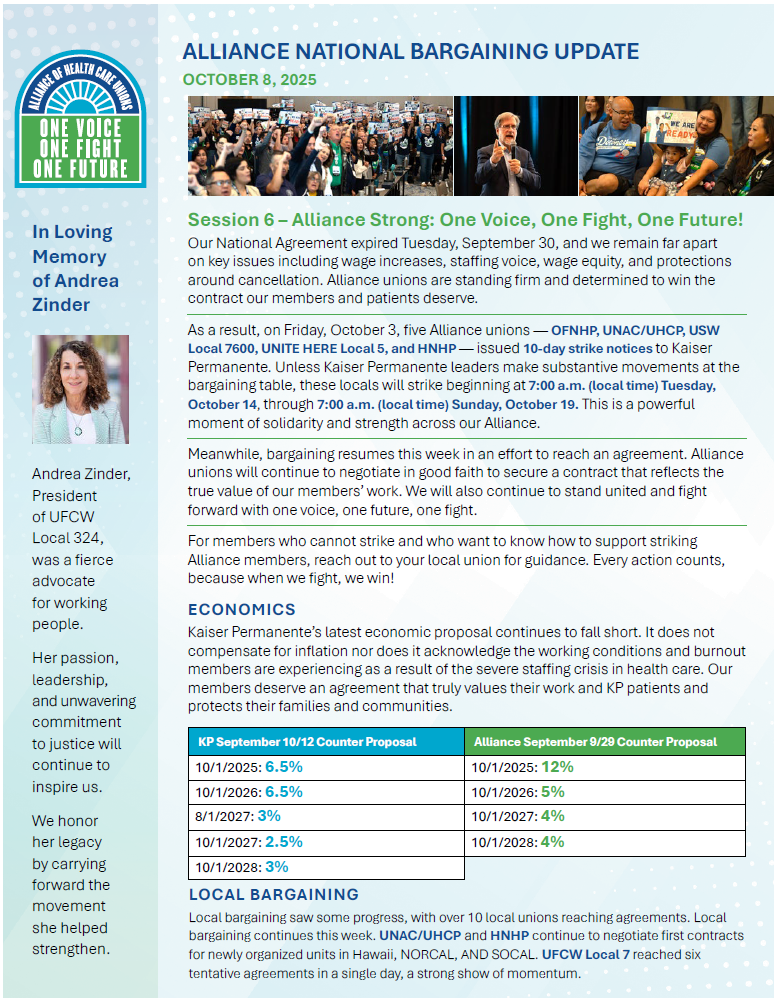First Round of Bargaining Finished
- Sandra Flores
- May 24, 2018
- 2 min read

“We want to emerge with a stronger partnership, with greater accountability, adequate training, and enforcement of our agreements at the local level.”
— KARLA LANGER, UFCW LOCAL 7
ANAHEIM — The Alliance Unions completed our first round of bargaining today. After kickoff speeches in plenary session late Tuesday, May 22, the parties spent most of the remaining time working in two bargaining subgroups — Commitment to Partnership and Operational Effectiveness.
As in every national negotiations since 2000, the parties are using interest-based bargaining, which has helped us protect our industry-leading wages, benefits, and voice at work through partnership. Over the three-day session, Union negotiators and observers caucused together, and in subgroups, to refine our union interests and begin brainstorming solutions.
Bargaining Topic Subgroups: The Commitment to Partnership sub-group is charged with strengthening partnership expectations and accountabilities, and developing a common understanding of success. More specific deliverables include improving the timeliness and effectiveness of problem-solving processes; developing an implementation plan to train new hires, mid-level union and management leaders, and frontline workers; and enhancing union growth within KP.
The Operational Effectiveness subgroup is asked to develop recommendations to measure performance improvements; improve implementation of current language on joint staffing, budgeting, and planned replacement; improve timely union engagement in operational decision-making; and encourage innovation and flexibility in meeting organizational goals.
A separate subgroup is meeting periodically to address economic issues including wages and benefits. The Economic Subgroup had an initial meeting on Thursday, May 24, to begin that work.
Union perspectives: Karla Langer of UFCW Local 7 said our goal is to build on previous agreements — our employment and income security, our voice in decisions that affect our work, and the provisions of the current National Agreement. “We want to emerge with a stronger partnership, with greater accountability, adequate training, and enforcement of our agreements at the local level.” She explained that when labor is involved from the beginning, “we get much more effective decisions.”
OFNHP member Elaine Carty is attending national negotiations for the first time, and she said that although it sometimes moves slowly, “Labor is all on the same page — we want a new beginning, a fresh start — and we want to hold ourselves accountable along with management.”
Elizabeth Carter, a UBT Co-chair from Steelworkers also highlighted accountability and decision-making. “At Redlands, we restructured our outreach to diabetic patients. At first, management implemented new procedures without input from those of us who do the work. There were things they didn’t think about — like refrigerators for vaccines. They went back and reworked it with input from us, and together we were able to improve the process, and decrease patients’ blood sugars.” She added that there has been “great energy” in the discussions with management so far.
We’ll be back at the national table next week, Wednesday, May 30 through Saturday, June 2.











Comments